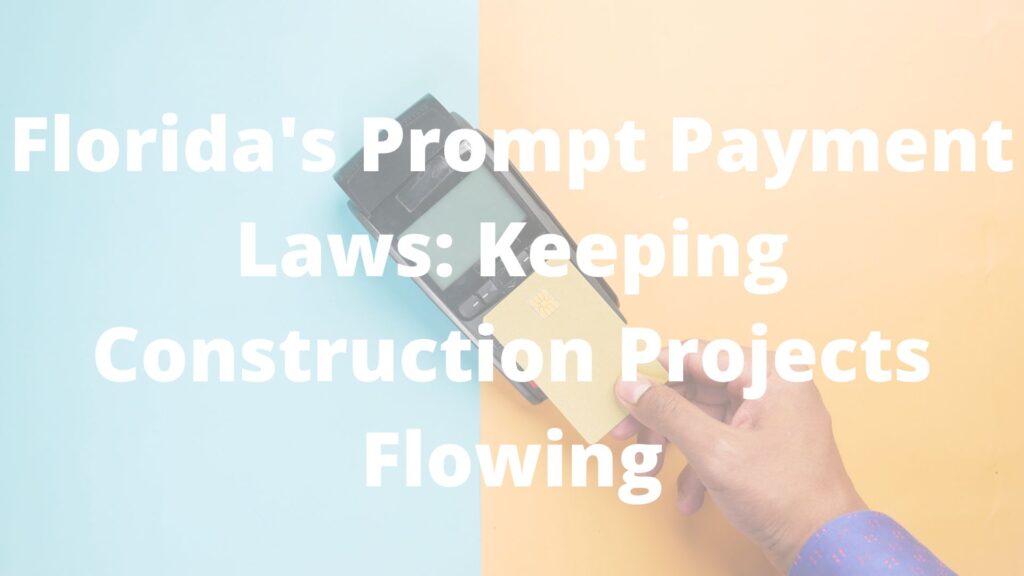
In the vibrant and ever-growing construction landscape of Florida, timely payments are crucial for project success. However, payment disputes can derail projects, leading to financial strain and legal battles. That’s where Florida’s prompt payment laws come into play, offering a framework to ensure contractors and subcontractors receive their due compensation within reasonable timeframes. These laws are designed to minimize delays, foster financial stability, and ultimately, keep construction projects moving forward.
Florida’s prompt payment statutes, primarily found in Chapter 713 of the Florida Statutes, mandate specific payment timelines for various parties involved in construction projects. For instance, owners are required to pay contractors within a certain period after receiving a proper invoice, and contractors, in turn, must pay their subcontractors within a defined timeframe. These laws aim to prevent owners and higher-tier contractors from withholding payments without legitimate cause. Failure to adhere to these timelines can result in penalties, including interest accrual and potential legal action. Understanding these statutes is vital for anyone engaged in Florida’s construction industry.
When payment disputes arise, construction litigation and arbitration often become necessary. Litigation involves pursuing a lawsuit in court, while arbitration offers a more streamlined, private alternative. Both avenues provide mechanisms for resolving payment disagreements and enforcing prompt payment obligations. However, construction litigation can be a lengthy and costly process, often involving extensive discovery and court appearances. Arbitration, on the other hand, typically involves a neutral third-party arbitrator who renders a binding decision based on the evidence presented. It’s often favored for its efficiency and confidentiality.
The complexities of Florida’s prompt payment laws can make navigating payment disputes challenging. Issues such as change orders, differing site conditions, and defective work can complicate payment timelines and lead to disagreements. Moreover, the specific language of construction contracts can significantly impact payment obligations. Therefore, it’s essential for contractors and subcontractors to carefully review their contracts and understand their rights and responsibilities under Florida law. Seeking legal counsel early in a payment dispute can help protect their interests and ensure compliance with the relevant statutes.
To further complicate matters, the nuances of retainage, or the percentage of payment withheld until the project is completed, often becomes a point of contention. Florida law also regulates the release of retainage, adding another layer of complexity to the payment process. Understanding these regulations is crucial for contractors and subcontractors to ensure they receive their full payment upon project completion. In cases of disputes regarding retainage, it is common to see these disputes end up in arbitration or litigation.
In conclusion, Florida’s prompt payment laws play a critical role in fostering a fair and efficient construction environment. By understanding these statutes and being prepared to navigate potential payment disputes through litigation or arbitration, contractors and subcontractors can protect their financial interests and contribute to the successful completion of construction projects across the state.
Resources:
- Florida Statutes, Chapter 713: http://www.leg.state.fl.us/statutes/index.cfm?App_mode=Display_Statute&URL=0700-0799/0713/0713.html
- Florida Construction Lien Law Summary: Many legal websites and firms provide summaries of the Florida Construction Lien Law, which includes prompt payment information. Search for “Florida Construction Lien Law Summary” for up to date information.
- Florida Bar Association: https://www.floridabar.org/ (For finding legal professionals specializing in construction law)
- Associated General Contractors of Florida: https://www.agcflorida.com/ (For industry resources and information)
 The author, John Caravella Esq., is a construction attorney and formerly practicing project architect at The Law Office of John Caravella, P.C., representing architects, engineers, contractors, subcontractors, and owners in all phases of contract preparation, litigation, and arbitration across New York and Florida. He also serves as an arbitrator to the American Arbitration Association Construction Industry Panel. Mr. Caravella can be reached by email: [email protected] or (516) 462-7051.
The author, John Caravella Esq., is a construction attorney and formerly practicing project architect at The Law Office of John Caravella, P.C., representing architects, engineers, contractors, subcontractors, and owners in all phases of contract preparation, litigation, and arbitration across New York and Florida. He also serves as an arbitrator to the American Arbitration Association Construction Industry Panel. Mr. Caravella can be reached by email: [email protected] or (516) 462-7051.
The information provided on this website does not, and is not intended to, constitute legal advice; instead, all information, content, and materials available on this site are for general informational purposes only. Readers of this website should contact their attorney to obtain advice with respect to any particular legal matter. No reader, user, or browser of this site should act or refrain from acting on the basis of information on this site without first seeking legal advice from counsel in the relevant jurisdiction. Only your individual attorney can provide assurances that the information contained herein – and your interpretation of it – is applicable or appropriate to your particular situation. Use of, and access to, this website or any of the links or resources contained within the site do not create an attorney-client relationship between the reader, user, or browser and website authors, contributors, contributing law firms, or committee members and their respective employers.
